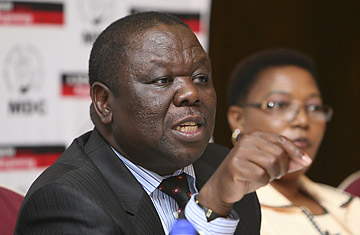
Morgan Tsvangirai, leader of the main opposition party in Zimbabwe addresses a press conference in Harare, Zimbabwe, February 10, 2009.
On Feb. 11, at the State House in Harare, Zimbabwe, the unthinkable will happen. Opposition leader Morgan Tsvangirai (pronounced CHANG-guh-rye) will officially join president Robert Mugabe as the country's prime minister — a move that comes less than a month after a spokesman for Tsvangirai's party, the Movement for Democratic Change (MDC), likened joining Mugabe's administration to committing "political suicide." Though Tsvangirai captured 5% more votes than Mugabe in the Mar. 29 presidential election, a campaign of violence against MDC supporters and Mugabe's stark refusal to relinquish power after nearly 30 years of uninterrupted rule has brought the Zimbabwean government to a standstill at the worst possible time.
With more than a quarter of Zimbabwe's population living as refugees outside of the country, a national unemployment rate of 94%, a cholera epidemic that has already killed 3,000 people and a currency rendered nearly useless by hyperinflation, Tsvangirai says the time for negotiation has passed. Explaining his decision to join Mugabe's government, the former mine worker compared the nation's humanitarian crisis to a bus hanging over a cliff: "If you allow it to tip over, we will all tip with it." (See pictures of political tension in Zimbabwe.)
Fast Facts:
• The eldest of nine children, Tsvangirai was born in 1952 in eastern Rhodesia, as Zimbabwe was then known. His father was a bricklayer.
• Left secondary school at the age of 22 to work in the Trojan Nickel Mine to help support his family, later becoming an active member and leader of the Associated Mineworkers Union.
• Married his wife Susan in 1978; the couple have six children. Their youngest — 13-year-old twins — live in Johannesburg.
• Became head of the Zimbabwe Congress of Trade Unions in 1988, pioneering labor reform despite recommendations by both the World Bank and the International Monetary Fund that African governments cap spending, including wages.
• Led a series of strikes called "stay-aways" in 1997 and 1998 against tax increases instituted by Mugabe. That same year, he chaired the National Constitutional Assembly, a nongovernmental organization dedicated to drafting a new constitution for Zimbabwe.
• Resigned from the National Constitutional Assembly in 1999 to found the Movement for Democratic Change (MDC), with support from students, intellectuals, trade unionists and white commercial farmers. The following year, the MDC helped defeat a constitutional reform bill that would have extended Mugabe's rule and appropriated farms from white landowners — Mugabe's first electoral defeat. In the June 2000 parliamentary elections, the MDC won almost as many seats as Mugabe's ZANU-PF party, despite a series of attacks that left nearly 30 supporters dead.
• Was imprisoned for six weeks in 1989 for allegedly spying for South Africa, and later acquitted of separate treason charges after being accused of plotting to assassinate Mugabe before the 2002 presidential election. Acquitted of treason again in 2004 following an 18-month trial for encouraging mass protests to overthrow the president.
• Survived a brutal attack by Zimbabwean police in March 2007 that drew worldwide condemnation and made Tsvangirai the face of Zimbabwean resistance; he has already survived 3 assassination attempts. After Mugabe called for a June 2008 runoff election, Tsvangirai fled the country amid police attacks against his supporters. According to Amnesty International, at least 100 MDC members have been killed since the election. Citing the bloodshed, Tsvangirai later withdrew his name from the ballot, though Mugabe proceeded with the election anyways and declared himself the winner.
Quotes About:
"He's been imprisoned, humiliated and accused of being a puppet of the West, but I believe he is a Zimbabwean patriot in touch with the vast majority of his people. He has shown he has stamina."
— George Bizos, a South African lawyer who was Mr. Tsvangirai's advocate during his treason trial in 2004, on critics who call Tsvangirai too naive or cowardly to address Zimbabwe's political and social ills (International Herald Tribune, May 24, 2008)
"You ask young people here what they want, and their No. 1 answer is 'I want to get the hell out of Zimbabwe.' They don't buy into the MDC."
— Mike Davies, leader of the Combined Harare Residents Association, on the internal strife that has plagued Tsvangirai's party (New York Times, May 9, 2007)
"The men had failed us. The solutions discussed weren't bread-and-butter issues, just power."
— Magodonga Mahlangu, of the Women of Zimbabwe Arise! organization, recalling the 2002 election between Mugabe and Tsvangirai (New York Times, Oct. 18, 2008)
Quotes By:
"He is the institution that has run our country for the last 30 years. And look at the results: unprecedented levels of decay and misrule and repression. So he should be accountable."
— Blasting Robert Mugabe and the ZANU-PF's refusal to release results of the Mar. 29 presidential election (Voice of America News, April 2, 2008)
"I will not be bulldozed into joining this government, which does not reflect the interests of the people. I'm not going to betray them."
— Upon returning to Zimbabwe after two months abroad (Associated Press, Jan. 17, 2009)
"We are also aware of the potential to help Zimbabweans and that's what we are going to do."
— On being aware of shortcomings of the power-sharing deal he struck with Mugabe ( Times of London, Feb. 9, 2009)
